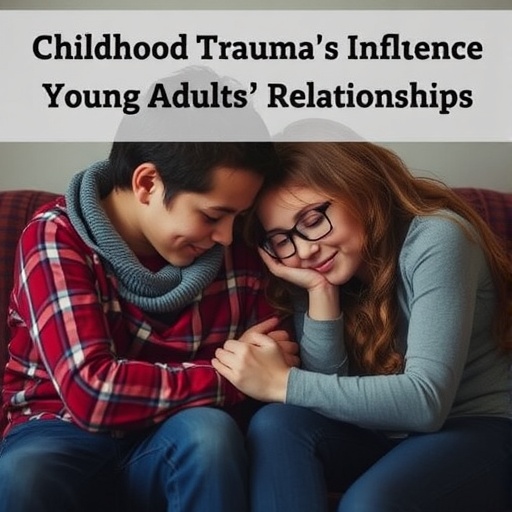Childhood is often perceived as a magical time, filled with joy and discovery. However, for many young individuals, it can be a period marked by trauma and emotional distress. Recently, researchers M. Rehman and S. Quddos delved into the profound effects of childhood trauma and rejection sensitivity on the development of interpersonal cognitive distortions in young adults. Their comprehensive study, set to be published in the Journal of Child and Adolescent Trauma in 2025, highlights the intricate relationship between early adverse experiences and later social interactions, offering crucial insights into mental health.
The concept of childhood trauma encompasses a broad spectrum of experiences including physical, emotional, and sexual abuse, neglect, and exposure to domestic violence. These experiences can significantly alter the way children perceive themselves and their surroundings. The repercussions are often long-lasting, manifesting in various psychological challenges as they transition into adulthood. Recent findings emphasize how such traumatic experiences predispose individuals to interpret social situations through a distorted lens, greatly affecting their relationships.
Rejection sensitivity, a closely related construct, refers to an excessive emotional response to perceived rejection. Individuals who experience high levels of rejection sensitivity may excessively interpret ambiguous social cues as negative or dismissive. This emotional disposition can lead to an escalation of anxiety and social withdrawal, further complicating an already difficult interplay with their environment. The research conducted by Rehman and Quddos investigates how these two factors interact, specifically focusing on their collective contribution to interpersonal cognitive distortions.
Interpersonal cognitive distortions consist of flawed thinking patterns that can plague one’s social interactions. These can range from catastrophizing social exchanges to personalizing negative feedback. When combined with the lasting scars of childhood trauma and the heightened sensitivity to rejection, young adults may find themselves trapped in a vicious cycle of misunderstanding and misinterpretation. This spiraling effect can ultimately undermine their relationships and hinder their capacity to form deep connections with others.
To illustrate the significance of their findings, Rehman and Quddos conducted a series of assessments involving young adults with varying backgrounds of childhood trauma. The methodology utilized a blend of qualitative interviews and quantitative measures to capture the depth and nuances of their experiences. The results indicated a strong correlation between histories of trauma, elevated rejection sensitivity, and the prevalence of cognitive distortions, allowing for a clearer understanding of these psychological phenomena.
An essential aspect of their research was the influence of socio-environmental factors on the interplay between childhood experiences and cognitive distortions. While individual experiences of trauma are vital in shaping psychological outcomes, the context in which those experiences occur can significantly modify their effects. Supportive relationships, positive reinforcement, and a nurturing environment can mitigate the adverse impacts of trauma, showing that resilience is possible even in the wake of early distress.
The implications of this study extend beyond mere academic curiosity; they underline the urgent need for effective therapeutic interventions. Mental health professionals might find that addressing rejection sensitivity and cognitive distortions in therapy can serve as a gateway to healing for those grappling with the scars of childhood trauma.
Moreover, the findings advocate for preventative strategies aimed at reducing childhood trauma and fostering healthier emotional responses to rejection. Programs designed to promote emotional literacy and resilience in children can provide invaluable tools to face and process difficult emotional experiences from an early age. By creating environments that encourage healthy coping mechanisms, society can begin to break the cycle of trauma that often spans generations.
The research conducted by Rehman and Quddos represents a critical juncture in understanding the long-term implications of childhood adversities. Their insights shed light on the underlying psychological mechanisms that contribute to interpersonal difficulties, encouraging a holistic approach to mental health that considers both the past and present.
As public awareness of mental health continues to evolve, uncoupling the chains of childhood trauma should be a priority not just for individuals but for society as a whole. By fostering communities where children feel safe and supported, we can cultivate a future where young adults are equipped to engage in meaningful and fulfilling relationships.
With the proliferation of mental health issues globally, studies like the one by Rehman and Quddos appear both timely and essential. They empower individuals to seek understanding and healing, while equipping therapists with nuanced perspectives on their clients’ experiences.
In conclusion, as we move towards a healthier collective understanding of trauma and its effects, the academic contributions of Rehman and Quddos will provide a foundation for further exploration in this fascinating field. Their work serves not only to illuminate the common pitfalls facing young adults shaped by childhood trauma but also to inspire efforts aimed at promotion, prevention, and ultimately, healing.
Subject of Research: The impact of childhood trauma and rejection sensitivity on interpersonal cognitive distortions in young adults.
Article Title: The Impact of Childhood Trauma and Rejection Sensitivity on Interpersonal Cognitive Distortions in Young Adults.
Article References:
Rehman, M., Quddos, S. The Impact of Childhood Trauma and Rejection Sensitivity on Interpersonal Cognitive Distortions in Young Adults. Journ Child Adol Trauma (2025). https://doi.org/10.1007/s40653-025-00723-z
Image Credits: AI Generated
DOI:
Keywords: Childhood Trauma, Rejection Sensitivity, Interpersonal Cognitive Distortions, Mental Health, Young Adults, Social Interactions, Psychological Resilience.




